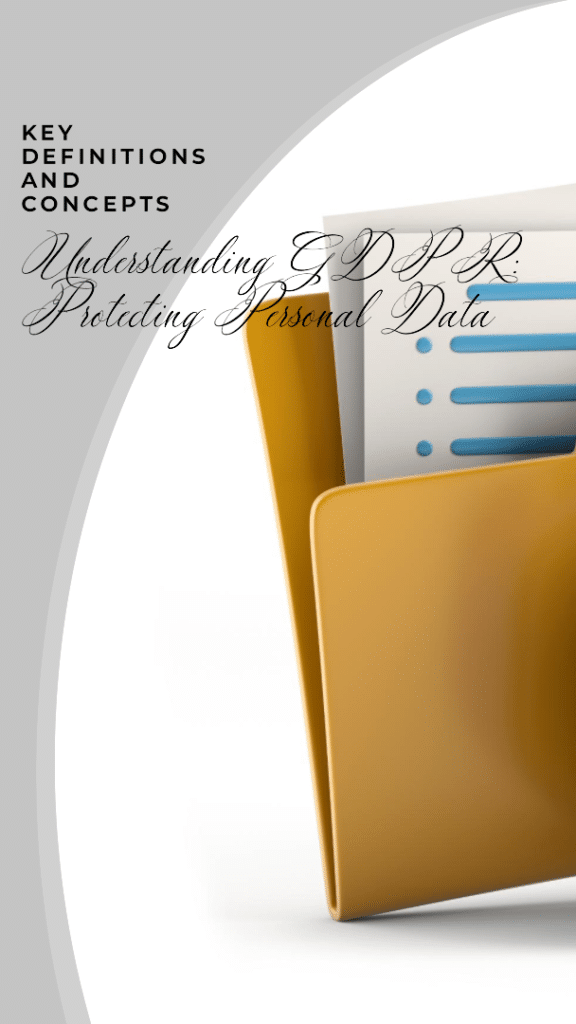Article 4 of the RGPD
Article 4 of the RGPD: definitions and key concepts for the protection of personal data
Introduction
The General Data Protection Regulation (GDPR), which came into force in May 2018, represents a major turning point in the protection of personal data within the European Union. Article 4 of the RGPD plays a key role in establishing the key definitions and fundamental concepts governing data protection. Understanding these terms is crucial to guaranteeing proper implementation of the RGPD and ensuring the confidentiality and security of individuals' personal data.
Key definitions in Article 4
Personal data
According to Article 4 of the RGPDPersonal data is defined as any information relating to an identified or identifiable natural person. This can include items such as name, address, telephone number, e-mail address, IP address, advertising identifier, location data, and more. Personal data is therefore at the heart of the RGPD, and its processing is subject to strict rules to ensure that individuals' privacy is protected.
Processing personal data
Article 4 of the GDPR defines the processing of personal data as any operation or set of operations which is performed upon personal data, such as collection, recording, organization, structuring, storage, adaptation, alteration, consultation, use, communication, dissemination, or any other form of making available, alignment or combination, restriction, erasure or destruction.
This definition therefore encompasses a wide range of actions undertaken with personal data, whether electronic or manual.
The data controller
Article 4 of the GDPR defines the controller as the natural or legal person, public authority, agency or other body which, alone or jointly with others, determines the purposes and means of the processing of personal data. In other words, the data controller is the entity that decides what data is collected and how it is used.
It is important to note that the data controller must comply with all the requirements of the GDPR regarding the collection, use and protection of personal data.
The Sub-Contractor
Article 4 of the GDPR defines a processor as the natural or legal person, public authority, agency or other body that processes personal data on behalf of the controller. Subcontractors may be external service providers, cloud providers, marketing agencies, among others.
It is essential that processors comply with the controller's instructions and take appropriate measures to protect personal data.
Key concepts of Article 4
The principle of data minimization
The principle of data minimization is set out in theArticle 5 of the RGPD. It stipulates that personal data must be adequate, relevant and limited to what is necessary for the purposes for which it is processed.
In other words, this means that companies should only collect personal data that is necessary to achieve the specific purpose for which it is collected, and should not retain this data for longer than is necessary.
For example, if a company wishes to send newsletters to its customers, it only needs their e-mail address, and does not need to collect any other personal information that is unnecessary for this purpose.
Consent of the person concerned
L'Article 6 of the RGPD states that the processing of personal data is only lawful if the data subject has given his or her explicit consent to the processing of his or her data for specific purposes. Consent must be free, informed, specific, unambiguous and given by a clear declaration or positive action.
To obtain valid consent, companies must clearly inform data subjects of the purposes of the processing, how the data will be used, the rights they have over their data, and the possibility of withdrawing their consent at any time.
Consent is therefore a fundamental element of the GDPR and an essential aspect of ensuring the protection of personal data.
Rights of persons concerned
The GDPR grants data subjects a set of essential rights regarding their personal data. These rights include:
The right of access Data subjects have the right to ask a company whether it is processing their personal data, and to obtain a copy of that data.
The right of rectification Data subjects have the right to request the correction of inaccurate or incomplete personal data.
The right to erasure Data subjects have the right to request the deletion of their personal data in certain circumstances, such as when the data is no longer necessary for the purposes for which it was collected.
The right to data portability Data protection: Data subjects have the right to receive their personal data in a structured, commonly used and machine-readable format, and to have it transmitted to another data controller.
The right to object to processing Data subjects have the right to object to the processing of their personal data in certain circumstances, such as when processing is based on the legitimate interests of the controller.
These rights enable individuals to exercise control over their personal data and protect their privacy.
Importance of Article 4 of the RGPD
Article 4 of the RGPD plays a key role in providing clear definitions and establishing fundamental concepts for the protection of personal data. By understanding these terms and principles, companies can guarantee correct implementation of the RGPD, avoid the risks of non-compliance, and ensure the confidentiality and security of individuals' personal data.
By complying with the requirements of Article 4 of the RGPD, companies strengthen trust and transparency with their customers, enhance their reputation, and commit to an ethical approach to personal data processing.
In brief
Article 4 of the RGPD plays a fundamental role in the protection of personal data within the European Union. By establishing clear definitions and key concepts, this article ensures a consistent and uniform approach to data protection across Europe.
Understanding these definitions and concepts is key to ensuring RGPD compliance, protecting individual privacy and building trust with customers.
By implementing a privacy-friendly approach and protecting personal data, companies can stand out in a changing digital landscape and strengthen their market position.






